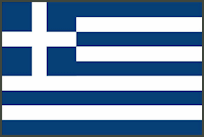Greece - Hellenic National Defence General Staff
 In order to implement the objectives of Defence Policy, the Armed Forces of the country are organised in Land, Naval and Air Forces. The geopolitical position of the country and the current Defence Doctrine dictate the form of this structure. The existing organisational structure of the three services is expected to be modified significantly in the coming years, according to the modernisation requirements and the need for improvement of the defence capabilities of the Armed Forces.
In order to implement the objectives of Defence Policy, the Armed Forces of the country are organised in Land, Naval and Air Forces. The geopolitical position of the country and the current Defence Doctrine dictate the form of this structure. The existing organisational structure of the three services is expected to be modified significantly in the coming years, according to the modernisation requirements and the need for improvement of the defence capabilities of the Armed Forces.
Joint Chiefs of General Staff Council consists of:
- Chief/HNDGS
- Chief/HAGS
- Chief/HNGS
- Chief/HAFGS
The Council's duties include decision making as provided by the existing legislation, as well as on issues submitted by the Minister of Defence, the Chief/HNDGS or by any other member. The submission of proposals or recommendations to the Minister of National Defence on issues of National Military Strategy, military evaluation of readiness, directions of defence planning, structure of the Forces, as well as on other issues of major importance.
The Chief/HNDGS is the head of the Hellenic National Defence General Staff and of all directly and indirectly subordinate services and units. He is selected by the Government Council on Foreign Affairs and National Defence among the Lieutenant Generals, Vice Admirals and Air Force Lieutenant Generals. He is appointed with a presidential decree and promoted to the rank of General, Admiral or Air Force General for a period of two years (which may be extended for one more year). The Chief/ HNDGS is the main advisor to the Minister of National Defence on military issues and military advisor to the Government Council on Foreign Affairs & National Defence and has a wide-ranging operational responsibility both in times of peace and war.
The Hellenic National Defence General Staff [HNDGS], under the Chief/HNDGS, is the Staff Agency which assists the Minister of National Defence to exercise his duties. It consists of the Joint Staff, services and directly and indirectly subordinate units and it is organised in Joint Staff Directorates (JSD) and branches. It comprises military and civilian personnel provided by all three services of the Armed Forces as well as the military personnel of the Joint Corps.
The Supreme Councils of the Services of the Armed Forces decide upon or make recommendations on issues such as :
- Organisation and structure for each one of the services.
- Operational Doctrine of the forces of each service.
- Discipline and internal administration.
- Armaments programs.
- Budget and public investment planning of each of the services.
- Assignments, promotions, retirements and complaints by officers about unfair treatment.
- Preparations of laws, decrees and regulations pertinent to each one of the services.
The Chief of each General Staff is the commandant of the respective Staff, and commands all of its units. He is selected by the Government Council on Foreign Affairs and National Defence and appointed by a presidential decree for a period of two years (which may be extended for one more year). Each one of the chiefs of the General Staffs is the main advisor to the Minister of Defence for issues, such as organisation and operational control of his service.
|
NEWSLETTER
|
| Join the GlobalSecurity.org mailing list |
|
|
|

